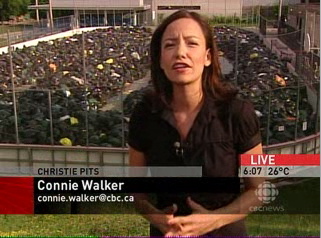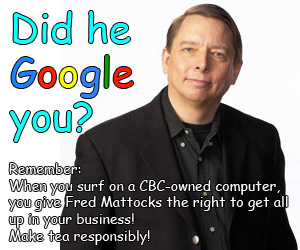Did CBC Toronto correspondent Connie Walker flunk J-school?
I don’t think that’s an uncharitable question. On last night’s CBC News at Six (the Toronto newscast, 2009.07.27), Walker exhibited almost the worst possible ethical lapse: She divulged the contents of an off-the-record interview.
I keep having to explain to the young journo kids that “off the record†is not some kind of really racy and zingy way to quote a source. The way they look at is as follows: A source might refuse to comment on the record, but then foolishly goes on to say something off the record. The greenhorn journo merely views this as a delicious occasion to report something like this: “Prime Minister Trudeau refused to comment today, but, off the record, he stated that what he actually said in Parliament was ‘go fuck yourself.’ â€
This is no longer a fanciful example. Reporting on the cleanup of garbage dumps after Toronto’s civic strike is over, at 0:08 in the newscast Connie Walker says, clear as a bell, “Now, I got to speak to a sanitation worker off the record today, and he estimates that it’ll take at least three days to clean up sites like this.â€

Refresher course
- Off-the-record status has to be agreed upon in advance. That means both sides have to agree and it has to happen before the source says anything that would be covered by the agreement. But to go back on the record, only the source’s statement to that effect is necessary. (That’s because the default is on the record. Everything is assumed for attribution unless otherwise agreed to.) Hence you can’t declare a statement off the record at any time, even retroactively. (That status must be negotiated.)
- Journalists may take notes or otherwise record off-the-record statements. In fact, they can be audiotaped or videotaped. There is no limitation on what records can be made or kept. The only limitation concerns what can be reported: Nothing.
- Journalists cannot mention that the interview happened (“Prime Minister Trudeau would only speak off the recordâ€) and cannot allude to or hint at the contents of the conversation (“The prime minister had no comment, but he left the impression his remarks as reported in Hansard were quite different from what he actually said in the Houseâ€).
Off-the-record statements are unreportable. Last night, Connie Walker went right ahead and reported an off-the-record interview. The fact that the source was, in effect, a garbageman and not the prime minister changes nothing.
There are only two ethical lapses more serious than this – plagiarism and falsification.

11 Comments
I expect this is a terminological confusion on her part, not an ethical lapse. Keep your friggin pants on.
Just another example of the CBC employing green journalists with no real background in news. The Corp., seemingly, will hire anyone and throw them on camera without a thought. “Journalism” is something the Corp., with the exception of Marketplace and the fifth estate, abandoned ages ago. Throw a junior reporter onto a big story with no support, and this is what we get.
Off-the-record is perhaps too often means confused with not-for-attribution. The source wants to get the info out, but doesn’t want to take the fall.
So they tell you something in the fervent hope you’ll pass it on to the public, without mentioning who told you. “A highly place White House source” is code for someone who very very much wanted to have something published/broadcast/both.
If there’s an error in the Connie Walker story it’s use of undeserved dramatic verbiage. All that was really neccesary was to report that “one sanitation worker told me he thought…”. (Whereas, in Fake Ouimet’s example, the reporter identifies “the prime minister”, as opposed to an anonymous “politcal worker”. Are you still with me FO?)
At worst, Connie added “off the record” was an attempt to lend dramatic investigative value to an otherwise banal and obvious tidbit of information.
Had she reported without seeking a separate, second source that a sanitation worker who was working at midnight last Friday had seen the Mayor having it on with a mermaid in the water treatment plant, she would then have violated off-the-record understandings.
Note to FO: get a grip. On-the-record, I’ll speculate there might well be scandalous goings-on at CBC News, but this ain’t one of ’em.
Just realized something: FO is a particularly apt acronyn.
We await an explanation from Connie herself.
she may also have meant “off camera”, and for whatever “off the record” slipped out. when it’s live, words can’t be sucked back in. just a thought.
I bet you she meant to say:
“Now, I got to speak to a sanitation worker earlier today, and he estimates that it’ll take at least three days to clean up sites like this.â€Â
Said sanitation worker probably refused to go on camera and say it, but that doesn’t mean his comment was ‘off the record’ the way you so accurately explain it here.
was this live? Or in her taped report? Reporters say all kinds of things when they’re live without the luxery of editing the wrong word out.
I just saw the ‘live’ super on the screen shot… so I’m guessing she just used the wrong expression to get her point across. She’s guilty only of speaking before thinking it through. No ethical lapse here.
My guess is that the interview wasn’t actually off the record — she just called it that. The source probably said, “Don’t use my name,” and she probably thought that was called “off the record.” I mean, it sounds all reportery, no?
also awesome that no producer gatechecked it. typical.
cbc journalism is increasingly lost to me. amateurish, smarmy and corny.
Yeah, there are many different kinds of “off the record,” including “deep background,” “not for attribution,” or just the “Dear God, don’t link it to me” kind of thing. Saying the comment came from a Sanitation Worker may well be within the deal she struck with whomever. I mean, think about it, if you’re told something off the record and can’t use it, ever, what’s the point? Off the record allows you to use the info without the identifying attribution. think senior “White House Officials said…” and all will become clear.
Understood. But Walker’s own report shows her conversation with the source wasn’t in the categories you cite. “Off the record†does not “allow you to use the info without… attribution.†The other categories you mentioned do. Off-the-record sources can’t be reported at all.
This is not a question of several names for the same thing (aqua, teal, blue, blue-green). “Off the record†and “on backgroundâ€Â are two different things.